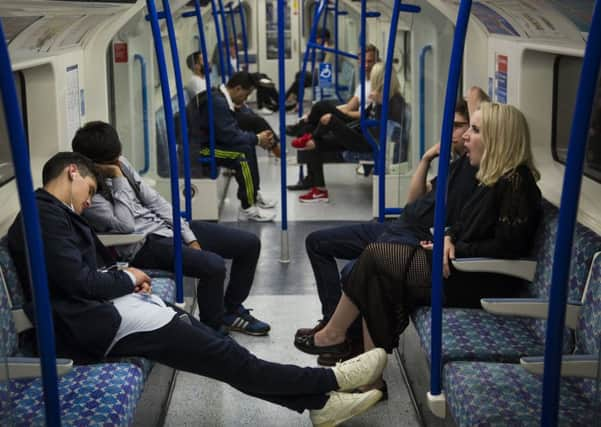Jane Bradley: It's good to talk...but we don't


But his “Tube Chat?” badges - indicating that a wearer is ready and willing to make conversation with fellow travellers - was met with outrage and horror from antisocial Londoners. One group even produced their own “Shut up” badges in response, emblazoned with the words: “Don’t even think about talking to me”.
Commuting is boring. Some people bring something to read, others fiddle with their phones, trying to look as if they have something
Advertisement
Hide AdAdvertisement
Hide Adimportant to do. They probably don’t. Despite Londoners spending an average of 74.2 minutes commuting a day, according to a report taken from census data a couple of years ago, they still do not want to make use of that time chatting to anyone, or even having any kind of social interaction whatsoever.
Instead, they waste days of their lives sitting on the same train or bus, staring at the same adverts, flicking through the same free newspaper.
The only difference on any daily commute is the people. You just never know who you could be sitting next to. I love meeting people on public transport, I do it all of the time. I have had a long-standing penpal relationship with a stamp collecting pensioner I once met on a train in Romania, while just the other week, I met a lovely retired teacher called Priscilla, who entertained me on the journey between Edinburgh and Leeds with stories of her time working in a missionary school in Nigeria in the 1960s.
Over the years, I have made work contacts, forged friendships with fellow travel enthusiasts and heard dozens of interesting life stories.
Sadly, I seem to be in a minority. Me and that poor old Mr Dunne, that is.
I’m just not sure when we lost the art of conversation. I would wager it happened at around the same time we started conversing not face to face, but through electronic messages.
“Some ideas for conversation,” LinkedIn regularly suggests on my newsfeed, proffering the idea that I congratulate someone on their “work anniversary”. Yes, you’ve got it. A work anniversary is a celebration of the day that you...started work.
On my own “work anniversary” a couple of months ago (six years at this esteemed publication, seeing as you asked), no fewer than eight people “started a conversation”, sending me messages to congratulate me, no doubt heeding LinkedIn’s prompts.
Advertisement
Hide AdAdvertisement
Hide AdProblem was, only two were people I have had any actual contact with in recent years: one being my dad, who sent the message with a large dollop of irony, having a pathological hatred of social media or any kind. The others included a former MSP I have never had any dealings with, a dinner lady at a school I have never heard of and a former editor, who rather hilariously, actually made me redundant from my last job. Perhaps he was being ironic.
I can wager that none of the people (except the former editor and hopefully my dad) actually know who I am, nevermind care how long I have been sitting behind this desk. Surprisingly, LinkedIn’s best efforts did not kickstart many meaningful conversations. It is too forced; too automated; too impersonal And that is all poor old Jonathan Dunne is trying to do: encourage people to start proper conversations. The great shame is that people need official confirmation that they are allowed to do so, without risking a personal rebuff or a slap in the face.
It’s OK to speak to the guy next to you - the badge he’s wearing confirms that he’s not likely to rough you up if you do. I can’t help wonder what would happen if someone tried a similar initiative to Tube Chat north of the border. To be honest, Edinburgh isn’t much better than London, when it comes to human interaction. When pregnant, I once spent a bus journey to work quietly retching into a plastic bag. If I had been in Glasgow, someone would have been holding my head and by the end of the journey, probably knitting me baby bootees. In Edinburgh, not so much. As I battled to keep the nausea under control, the other passengers all politely looked out of the window and hoped I’d be getting off at the next stop. Elsewhere, though - like the north east of England where I grew up and where the shopkeepers call you flowerpot and the queues in Asda trail into the aisles as people use a shopping trip to catch up with friends, acquaintances and the lady on the checkout - Scots are generally friendlier.
Yes, in most places, such encouragement for ordinary human interaction is unnecessary, thank goodness. But that is not true everywhere. As the Fox’s advert used to go: “London needs biscuits”. And similarly, London - and Edinburgh - needs Tube Chat, or at least to embrace the ethos behind it. Don’t let the misanthropes get you down, Jonny.